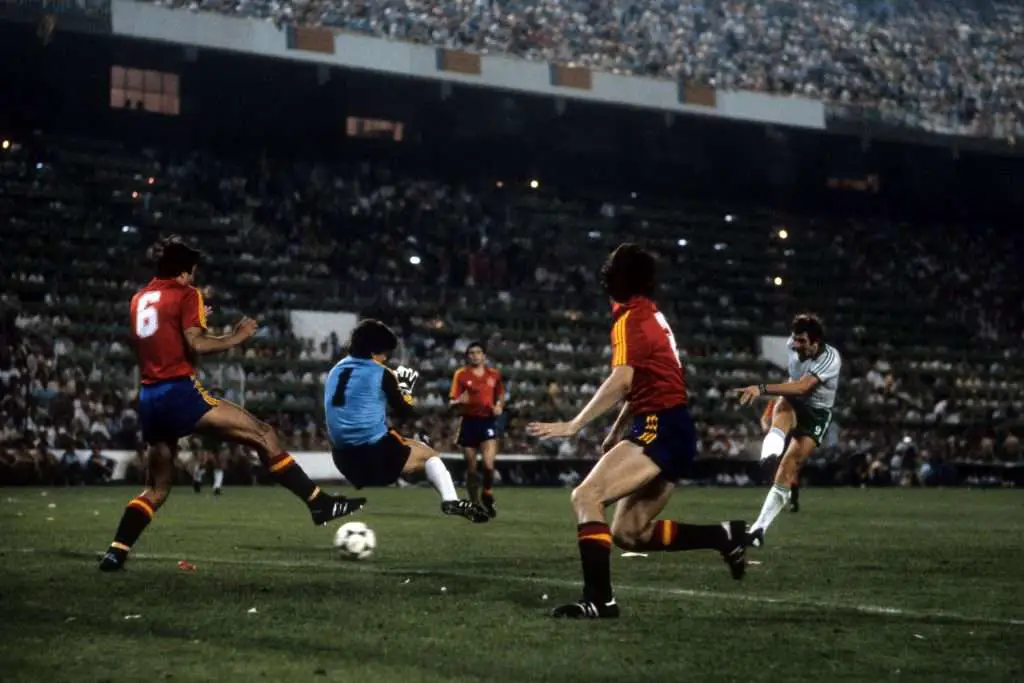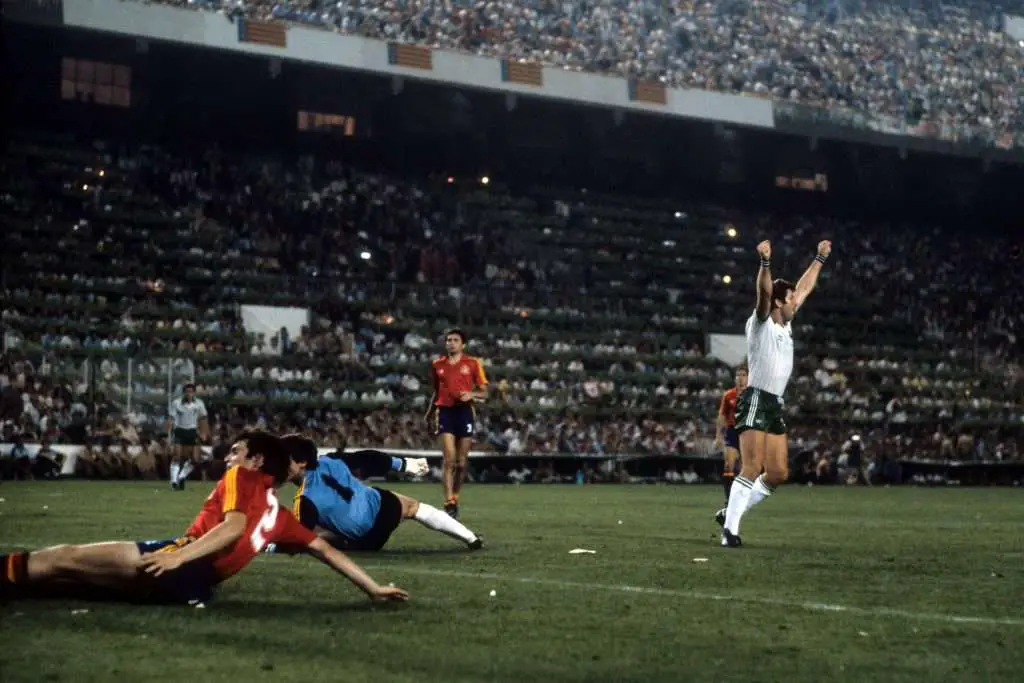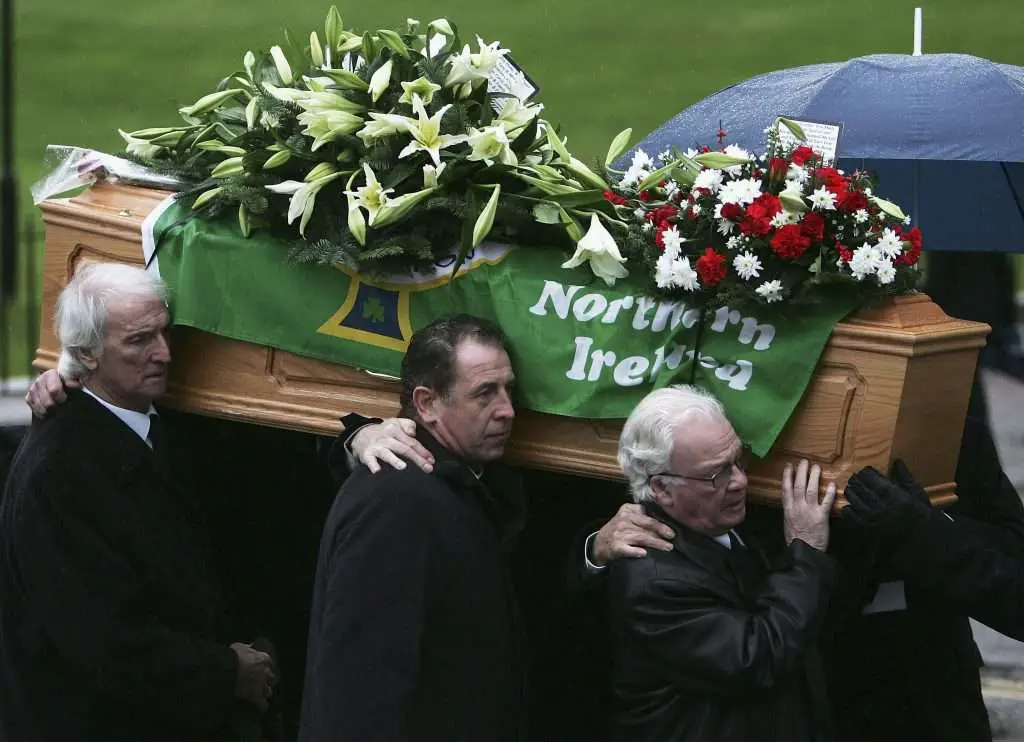This week, Get Spanish Football News sat down with Northern Ireland football legend Gerry Armstrong for an extensive, exclusive interview to discuss his career, becoming the voice of Spanish football, and his friend George Best.
It’s 5 am in the morning on the 26th of June 1982. Gerry Armstrong and his last line of defence, goalkeeper Pat Jennings, are enjoying tea and toast from the balcony of their Valencian hotel.
The pair haven’t slept much since their historic victory over host nation Spain hours before at the Mestalla.
For Armstrong in particular, the delirium of the previous evening’s events is yet to settle. He has, of course, just scored the winning goal in a famous 1-0 win for Northern Ireland in the 1982 World Cup.
A couple of floors below, renowned Belfast journalist Malcolm Brodie is furiously typing the copy that will propel Armstrong into superstardom.
For now, at least, Spain is merely the land of the rising sun, but it will soon become home for their adopted Northern Irish son.

A lot has happened in the intervening 38 years. For instance, this writer has been born, raised, and is currently having tea and toast to the backdrop of a cruel, grey November evening in Dublin. The romance is not lost on him either.
For Armstrong, the years have not diminished his exuberance for the beautiful game. His winning goal at the Mestalla was the start of a long connection with Spanish football that continues into the present day.
Playing for Watford at the time of the World Cup, under the tutelage of future England manager Graham Taylor, Armstrong’s profile shot to prominence overnight.
Not that Watford were keeping a low profile to begin with. The Hornets were then owned by pop sensation Elton John.
Armstrong recalls the pre-season parties the team would enjoy at the singer’s Windsor mansion.
“Elton John was a superstar, but he wanted to be a footballer. Everyone from the players to the ground staff were invited, including their families. He was the nicest guy, he just wanted to be one of the lads. The only person he was a bit afraid of was Graham Taylor!”
Taylor was a disciplinarian, who moulded Armstrong and others into a hyper-athletic, cohesive unit. Armstrong excelled in the system and played some of the best football of his career. After his heroics at the World Cup however, Spanish clubs came calling.
In 1983, Armstrong made the switch to Real Mallorca, eager to test himself in a new culture.
“I was really curious why a team from a slick passing country would want a British-style striker like me. When I signed, they told me that they were looking for someone with more of a physical presence, who would put themselves about up front. I fit that profile I suppose.”
The early ’80s in Spain was dominated by clubs with a physical presence, especially the Basque teams who were sweeping up the domestic honours. Real Sociedad were champions in 1981 and 1982, followed by Athletic Club’s victories in 1983 and 1984.
According to Armstrong however, his Mallorca teammates lacked the same physical and mental strengths.

“The Spanish lads didn’t train hard enough in my opinion. So I would stay on after training, with a couple of the Argentinian lads to work on speed and conditioning. The Spanish just weren’t interested, it wasn’t in their culture at the time.”
Conditioning is something that Armstrong prided himself on during his playing days, excelling from an early age in Gaelic Football and Hurling in his native Antrim. He only began playing organised soccer at the age of 16 after a suspension from a Gaelic football match.
It wasn’t long before English clubs came sniffing around, and despite interest from Arsenal and Everton, he signed for Tottenham Hotspur in 1975, where he developed his craft alongside the up and coming talent of Glenn Hoddle. He was in awe of the Englishman’s refined skill set.
“I made my international debut with Northern Ireland around the same time that Glenn made his for England. I always felt he was under appreciated and underutilised by England.
Ossie Ardiles once told me, when his English improved, that the Argentinian coach César Luis Menotti would have built the team around a player like Glenn. He eventually did with Maradona, who is Glenn’s favourite player to this day.”
Armstrong was no stranger to playing with superstars, having made his international debut alongside his childhood hero George Best.
“Every kid on my street wanted to be George Best. I always thought he looked like a ballerina on the pitch. So to make my debut alongside him was something special.
His problems off the pitch are well documented, but honestly he was the most unassuming guy, no ego whatsoever, the easiest company and really one of the nicest people I’ve met in my life.”

Where Best changed Armstrong’s life on the pitch, he replicated it off the pitch, suggesting that his expertise would suit Sky’s early coverage of La Liga.
“George was working for Sky at the time and he put my name forward given my expertise of Spanish football and my ability to speak the language. 22 years later, I was still there so I guess I was doing something right!”
Armstrong’s voice became synonymous with English coverage of La Liga, both as a pundit and co-commentator alongside former Derby County goalkeeper Rob Palmer.
“I brought a level of expertise that was lacking at Sky early on. I was able to give good insights given my background. On top of that, I worked very hard. Anyone that I’ve worked for knows that I do my homework.”
Armstrong became entrenched in La Liga, so much so that he would often field late night phone calls from another former Manchester United No 7.
“David Beckham used to call me up, usually after midnight, to thank me for my analysis of Real Madrid games. I told him straight out that if he’d had a bad game I would have said so, there was no preferential treatment.
On a few occasions, I suggested that Fabio Capello should put him back into the team for creativity purposes. I guess he and his family back in England felt that I was in his camp on things.
It’s funny because George always said that Beckham wasn’t fit to lace his boots, but I thought David was a fantastic player for Real Madrid and Man United.”
Quizzed on his favourite El Clásico moments from his time at Sky Sports, Armstrong becomes excitable. He has attained footballing nirvana, and enters his happy place.
“For me it was always a real privilege to watch Zinedine Zidane, I could just watch him all day. Big Ron was also just top class.
Going back even further, I have to say Romario and Rivaldo were just a joy to watch. People always forget about them. I have so many fond memories from that era, it’s hard to account for them all.”
In 2018, Sky lost the rights to show La Liga for the first time in 22 years. This has not quelled Armstrong’s passion for Spanish football. He still covers Spanish international games and European fixtures for Virgin Media Ireland.
Before letting him go, I persuade Gerry to repeat one of his most iconic player pronunciations, the former Real Madrid midfielder, José María Gutiérrez Hernández (Guti). He relays it musically. I now join him in footballing nirvana.
“That was probably one of the few ones I got right,” he laughs, as we both drift off into our respective Iberian daydreams.










